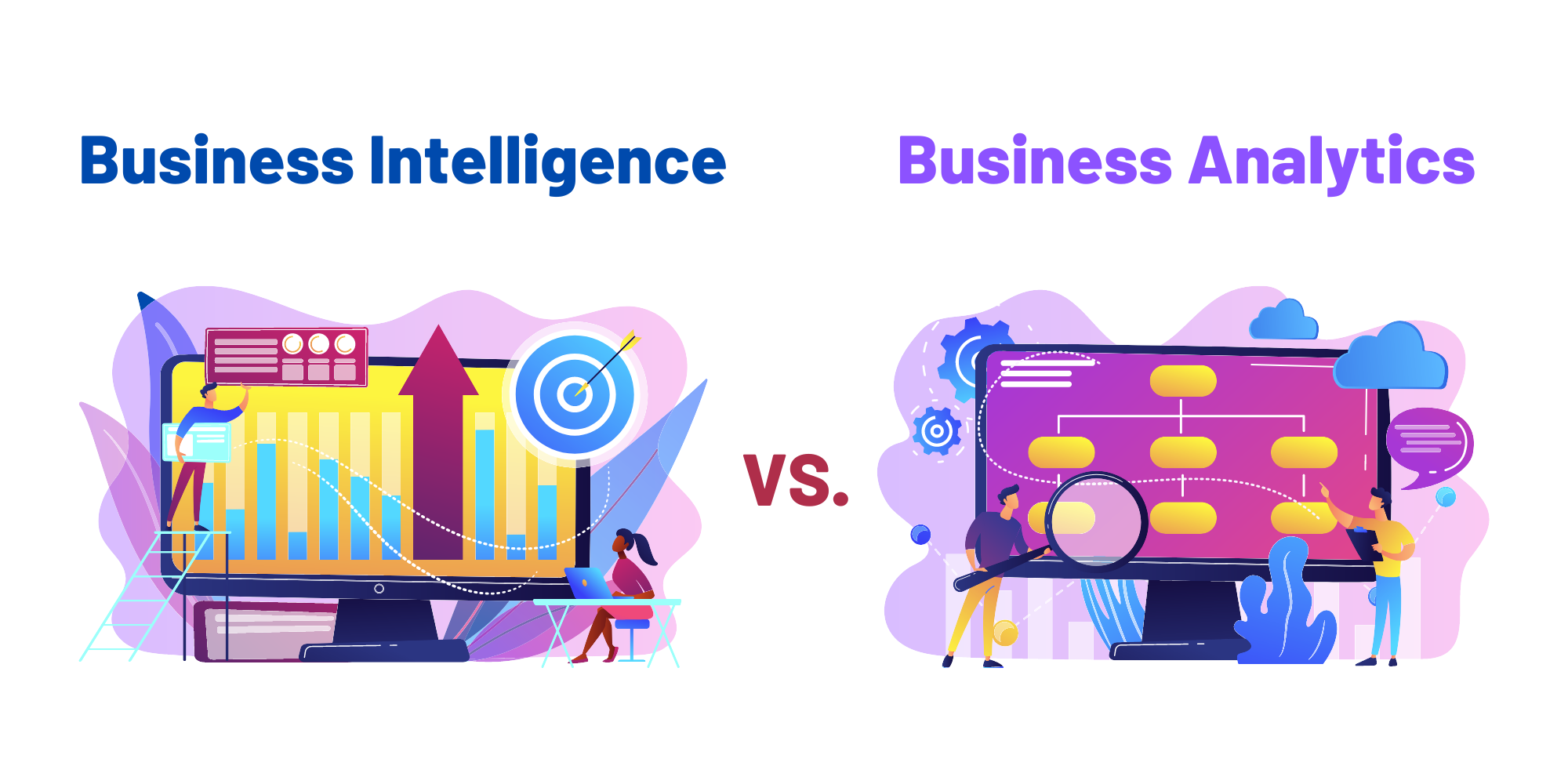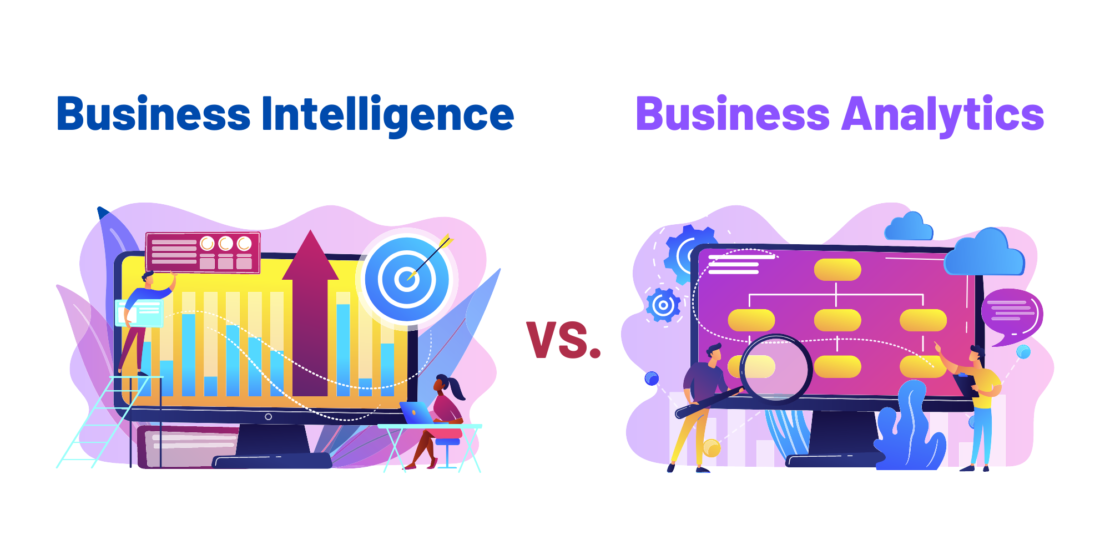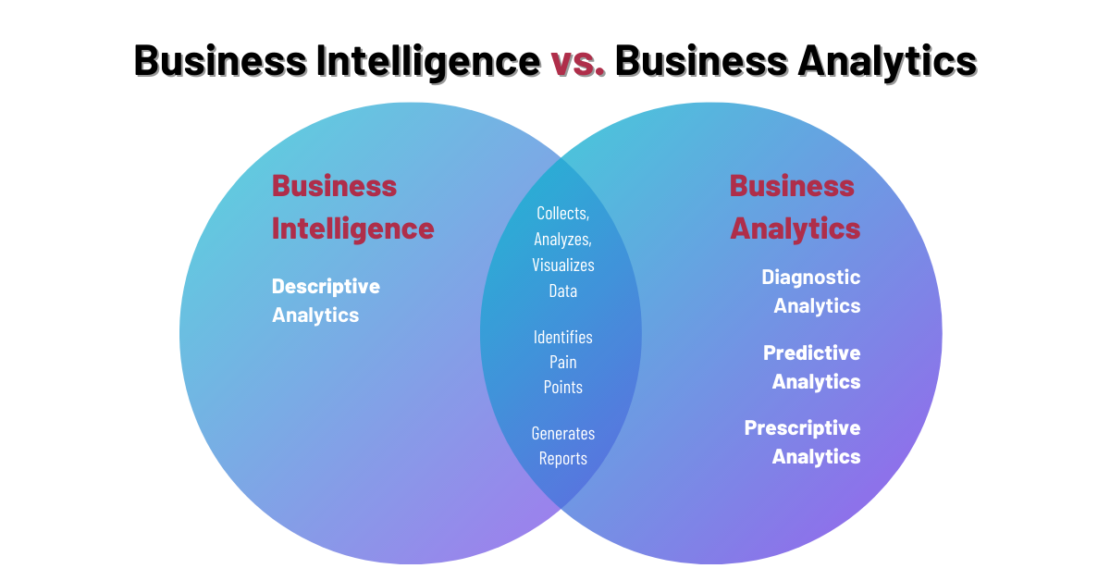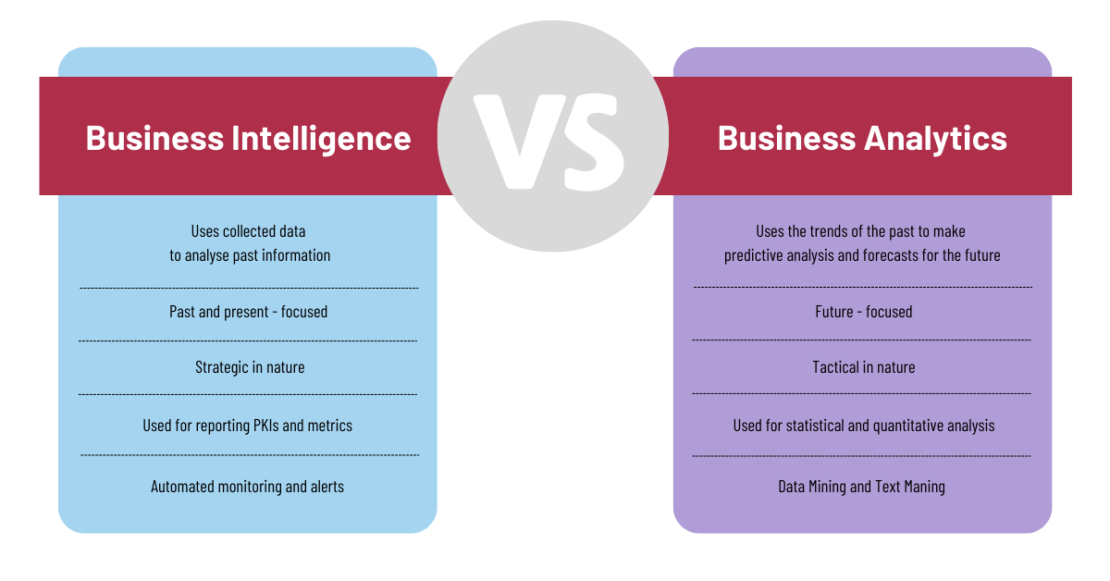Business Intelligence vs Business Analytics. Differences
11 August 2022
Reading time: 6 minutes

The amount of data that we create is growing at a staggering pace. Keeping track of it becomes more difficult. Modern organizations generate enormous amounts of data every day. Selecting information for those that are valuable turns out to be quite a challenge.
To use data properly, you need to know which to analyze and how to do it skillfully. Growing organizations need techniques and tools to turn information into valuable data so they can make the right business decisions and scale their business. Find out about the differences between Business Intelligence systems and Business Analytics.
What is Business Intelligence and Business Analytics
Business Intelligence (BI) is a collection of tools used together with technology and expertise to communicate and visualize operational business data. BI is about accessing and exploring data to improve the company’s financial performance and eliminate potential threats. Organizations can operate more efficiently and obtain insightful data by leveraging BI reporting and visualization. Business Intelligence systems significantly contribute to increasing the company’s competitiveness.
Business Analytics (BA) bases its operations on data, using it to identify current problems and challenges, anticipate future difficulties, and ensure a stable future for the organization. It involves the use of statistical analysis and predictive modeling to determine trends and answer the question of why the phenomenon happened. On this basis, forecast future events. The use of this solution helps the company to plan appropriate activities to properly manage the business plan and increase efficiency.
Both BI and BA have undergone significant modifications by Big Data and predictive analytics, making them extremely important data management tools tailored to current requirements.

What are the basic differences between BI and BA
Business Analytics relies on the accurate interpretation and implementation of the collected data, creating space for more practical operations in the future, making this solution more futuristic. In contrast, the main purpose of Business Intelligence is to monitor data to provide more valuable information.
The main differences between BI and BA are the questions they answer.
Business Intelligence focuses on descriptive analytics that provides a summary of historical and present data. It tells about what has happened or what is currently happening. It is an answer to the questions of “what” and “how”, where the result is information about what is working properly and what should be improved.
Business Analytics focuses on predictive analytics that uses data mining, modeling, and machine learning (ML) to determine the likelihood of future outcomes. BA answers to the question “why” by being able to forecast future events. With BA, you can anticipate changes and make the modifications necessary to succeed.

The use of Business Intelligence and Business Analytics in reality
In order to properly understand the difference, it is good to refer to the example, which will show to what extent these solutions are used. To illustrate the situation, let’s imagine an electronics retailer in an online store.
The use of Business Intelligence will provide useful reports on the past and present. This solution will report and visualize the information we have collected during the company’s operations. This is a way to find out, among other things, in which period a given product generated much more sales than usual. Thanks to this information, we can invest capital in a specific product to keep up with the demand.
In the case of Business Analytics, it becomes relevant why sales of a particular product increased during a given period. After analyzing the data, we receive information about the reasons why a given product gained more interest.
In this case, the use of collected information about the company, both historical and current (BI), allows you to make appropriate business decisions in the field of sales. This is an action taken to keep up with the demand, should we decide to introduce measures in the future that, based on our analysis (BA), would have an impact on sales growth.
For consumer services and goods, we can divide BA and BI into:
- BI: Applying this method will help you analyze your sales by discovering key buyer metrics and existing patterns. This data includes customer demographics, conversion rates, product area performance, site and store visits, bounce rates, and cart abandonment.
- BA: By reviewing the same metrics, you will evaluate market demand and buyers’ data to determine if your marketing campaigns require additional action. You will develop maintenance and implementation strategies such as rebates and loyalty programs using statistics.

Summary of Business Intelligence and Business Analytics
Business Intelligence focuses on what has happened in a given organization or what is happening now. The relevant BI platform is so detailed that it describes the information in real time so precisely that it answers the questions that interest us. In this case, the work with the data takes place up to the present, and the way they are used depends on what we want to get from the information obtained.
Business Analytics mainly works on predicting what will happen in the future. It is a combination of advanced statistical analysis and predictive modeling to create an idea of future situations. It is helpful for predicting possible development paths or making changes to eliminate ineffective methods in order to improve financial results.
Both solutions seem similar, but the difference between BI and BA can be seen if we analyze our data usage needs. Business Intelligence uses past and present data to optimize the present for recent success, while Business Analytics analyzes the present to prepare companies for the future.
Business Analytics or Business Intelligence. Which solution to choose
Both BI and BA are extremely valuable tools supporting data management. It is important to answer the question what we expect and what is important to us. It is worth considering whether the organization needs a descriptive analysis or a predictive analysis. Perhaps it will be appropriate to invest in both platforms.
In a situation where we are able to forecast future growth, but we do not have adequate insight into the basic data, we are not able to properly understand the basis of a given forecast. We will not adjust the dashboards properly, so we will not get exactly the information we need, and this will limit our business planning.
Companies need insight into their business performance to properly manage their business. Skills, technology and strategies designed to draw conclusions are still evolving. It is often difficult to determine what exactly will be helpful for us and what we should invest in to achieve goals and increase profits.
The most important thing is to define what is important to our organization. For what purposes do we need a given platform and who will be its main user? How detailed information do we need and what conclusions do we want to draw? What is the level of technological advancement of people who will be users of given systems? How much control and transparency do you need for your process and source data?
The answer to the above questions will guide the requirements. On this basis, it will be possible to determine the level of self-service and select the appropriate method as part of descriptive or predictive analysis, or maybe a combination of two platforms.
Do you have questions or need help choosing between Business Intelligence and Business Analytics?
Schedule a free consultation. Consult your company needs with our experts. Learn about solutions that will help your company improve business processes and ensure data security.
